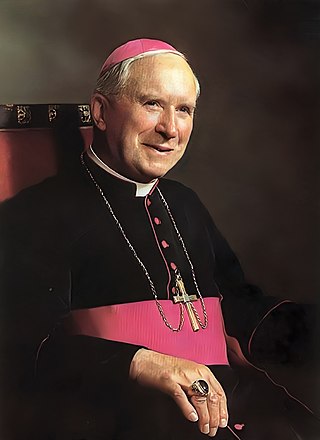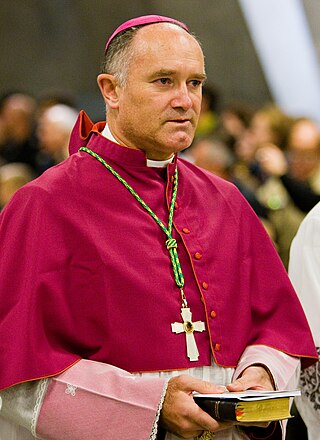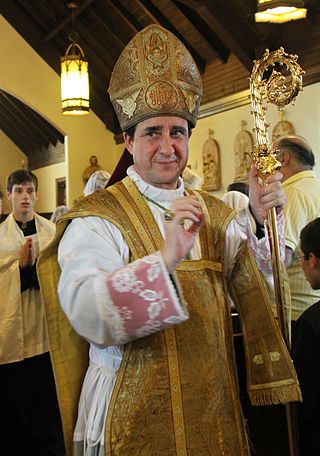
Marcel François Marie Joseph Lefebvre was a French Catholic archbishop who influenced modern traditionalist Catholicism. In 1970, five years after the close of the Second Vatican Council, he founded the Society of Saint Pius X (SSPX), a community to train seminarians in the traditional manner, in the village of Écône, Switzerland. In 1988, Pope John Paul II declared that Archbishop Lefebvre had "incurred the grave penalty of excommunication envisaged by ecclesiastical law" for consecrating four bishops against the pope's express prohibition but, according to Lefebvre, in reliance on an "agreement given by the Holy See ... for the consecration of one bishop."

The Society of Saint Pius X is a canonically irregular traditionalist Catholic priestly fraternity founded in 1970 by Archbishop Marcel Lefebvre. Lefebvre was a leading traditionalist at the Second Vatican Council with the Coetus Internationalis Patrum and Superior General of the Holy Ghost Fathers until 1968. The society was initially established as a pious union of the Catholic Church with the permission of François Charrière, the Bishop of Lausanne, Geneva and Fribourg in Switzerland.
In Catholic canon law, an interdict is an ecclesiastical censure, or ban that prohibits certain persons or groups from participating in particular rites, or that the rites and services of the church are prohibited in certain territories for a limited or extended time.
Ecclesia Dei is the document Pope John Paul II issued on 2 July 1988 in reaction to the Ecône consecrations, in which four priests of the Society of Saint Pius X were ordained as bishops despite an express prohibition by the Holy See. The consecrating bishop and the four priests consecrated were excommunicated. John Paul called for unity and established the Pontifical Commission Ecclesia Dei to foster a dialogue with those associated with the consecrations who hoped to maintain both loyalty to the papacy and their attachment to traditional liturgical forms.

Bernard Fellay is a Swiss bishop and former superior general of the Traditionalist Catholic priestly fraternity Society of Saint Pius X (SSPX). In 1988, Pope John Paul II announced that Fellay and three others were automatically excommunicated for being consecrated as bishops by Archbishop Marcel Lefebvre, an act that the Holy See described as "unlawful" and "schismatic". Archbishop Lefebvre, and Bishop Antônio de Castro Mayer who co-consecrated these four bishops, were also said to be automatically excommunicated. At that time, he was the youngest bishop of the Roman Catholic Church at 30 years old.

Bernard Tissier de Mallerais is a French traditionalist Catholic prelate, serving as a bishop of the Society of Saint Pius X.

Alfonso de Galarreta Genua,, is a Spanish-born Argentine bishop of the Society of Saint Pius X. Bishop de Galarreta has served as the First Assistant of the Society of Saint Pius X, working under the direction of the Superior General Fr. Davide Pagliarani, since 2018. In addition to this, Bishop de Galaretta has been the President of the SSPX—Vatican Commission since 2009, which directs the Society's correspondence with the Holy See.
Validity and liceity are concepts in the Catholic Church. Validity designates an action which produces the effects intended; an action which does not produce the effects intended is considered "invalid". Liceity designates an action which has been performed legitimately; an action which has not been performed legitimately is considered "illicit". Some actions can be illicit, but still be valid.
Latae sententiae and ferendae sententiae are ways sentences are imposed in the Catholic Church in its canon law.

The Écône consecrations were Catholic episcopal consecrations in Écône, Switzerland, on 30 June 1988 performed by Archbishop Marcel Lefebvre and Bishop Antônio de Castro Mayer. The bishops consecrated were four priests of Lefebvre's Society of Saint Pius X (SSPX). The consecrations, performed against the explicit orders of Pope John Paul II, represented a milestone in the troubled relationship of Lefebvre and the SSPX with the Church leadership. The Holy See's Congregation for Bishops issued a decree signed by its Prefect Cardinal Bernardin Gantin declaring that Lefebvre and De Castro Mayer had incurred automatic excommunication by consecrating the bishops without papal consent, thus putting himself and his followers in schism.
Canon 1397 §2 is a paragraph of the canon 1397 of the 1983 Code of Canon Law of the Catholic Church; the paragraph states: "A person who actually procures an abortion incurs a latae sententiae excommunication".
Canon 915, one of the canons in the 1983 Code of Canon Law of the Latin Church of the Catholic Church, forbids the administration of Holy Communion to those upon whom the penalty of excommunication or interdict has been imposed or declared, or who obstinately persist in manifest grave sin:
Those who have been excommunicated or interdicted after the imposition or declaration of the penalty and others obstinately persevering in manifest grave sin are not to be admitted to holy communion.
The canonical situation of the Society of Saint Pius X (SSPX), a group founded in 1970 by Archbishop Marcel Lefebvre, is unresolved. The Society of Saint Pius X has been the subject of much controversy since 1988, when Bernard Fellay, Bernard Tissier de Mallerais, Richard Williamson and Alfonso de Galarreta were illicitly consecrated at Ecône, at the International Seminary of Saint Pius X as bishops in violation of canon law. Lefebvre and the four other SSPX bishops individually incurred a disciplinary latae sententiae excommunication for the schismatic act; the excommunications of the four living SSPX bishops were remitted in 2009.
The official teachings of the Catechism of the Catholic Church promulgated by Pope John Paul II in 1992 oppose all forms of abortion procedures whose direct purpose is to destroy a zygote, blastocyst, embryo or fetus, since it holds that "human life must be respected and protected absolutely from the moment of conception. From the first moment of his existence, a human being must be recognized as having the rights of a person – among which is the inviolable right of every innocent being to life". However, the Church does recognize as morally legitimate certain acts which indirectly result in the death of the fetus, as when the direct purpose is removal of a cancerous womb. Canon 1397 §2 of the 1983 Code of Canon Law imposes automatic excommunication on Latin Catholics who actually procure an abortion, if they fulfill the conditions for being subject to such a sanction. Eastern Catholics are not subject to automatic excommunication, but by canon 1450 of the Code of Canons of the Eastern Churches they are to be excommunicated by decree if found guilty of the same action, and they may be absolved of the sin only by the eparchial bishop. In addition to teaching that abortion is immoral, the Catholic Church also generally makes public statements and takes actions in opposition to its legality.
In the canon law of the Catholic Church, excommunication is a form of censure. In the formal sense of the term, excommunication includes being barred not only from the sacraments but also from the fellowship of Christian baptism. The principal and severest censure, excommunication presupposes guilt; and being the most serious penalty that the Catholic Church can inflict, it supposes a grave offense. The excommunicated person is considered by Catholic ecclesiastical authority as an exile from the Church, for a time at least.

Monseigneur Lefebvre, un évêque dans la tempête is a 2012 documentary film by French director Jacques-Régis du Cray, primarily based on the biography A biography of Archbishop Lefebvre written by Bishop Bernard Tissier de Mallerais.
In 2009, a 9-year-old Brazilian girl was repeatedly raped by her stepfather and became pregnant with twins; the girl's mother helped her procure an abortion, and the pregnancy was terminated. José Sobrinho, a Catholic archbishop, said that the girl's mother and the doctors who performed the abortion had been automatically excommunicated under canon law. This prompted an array of national and international criticism for the archbishop's actions. In response, the National Conference of Bishops of Brazil declared that no one was excommunicated in the case, and in an article published in L'Osservatore Romano, a bioethicist of the Holy See rebuked the archbishop for his public statement.
A censure, in the canon law of the Catholic Church, is a medicinal and spiritual punishment imposed by the church on a baptized, delinquent, and contumacious person, by which he is deprived, either wholly or in part, of the use of certain spiritual goods until he recovers from his contumacy. These goods can encompass access to the sacraments, participation in certain liturgical activities, and involvement in ecclesiastical functions.
Decree on the Attempted Ordination of Some Catholic Women is a canonical decree issued by the Congregation for the Doctrine of the Faith, under Cardinal Joseph Ratzinger, and approved by Pope John Paul II on December 21, 2002. It can be found in Acta Apostolicae Sedis 95 (2003). The decree is in response to Romulo Antonio Braschi ordaining seven Catholic women to the priesthood of his movement, the Catholic Apostolic Charismatic Church of Jesus the King, on June 29, 2002, and is a follow-up to a decree of excommunication of Braschi and the women issued on August 5, 2002.






